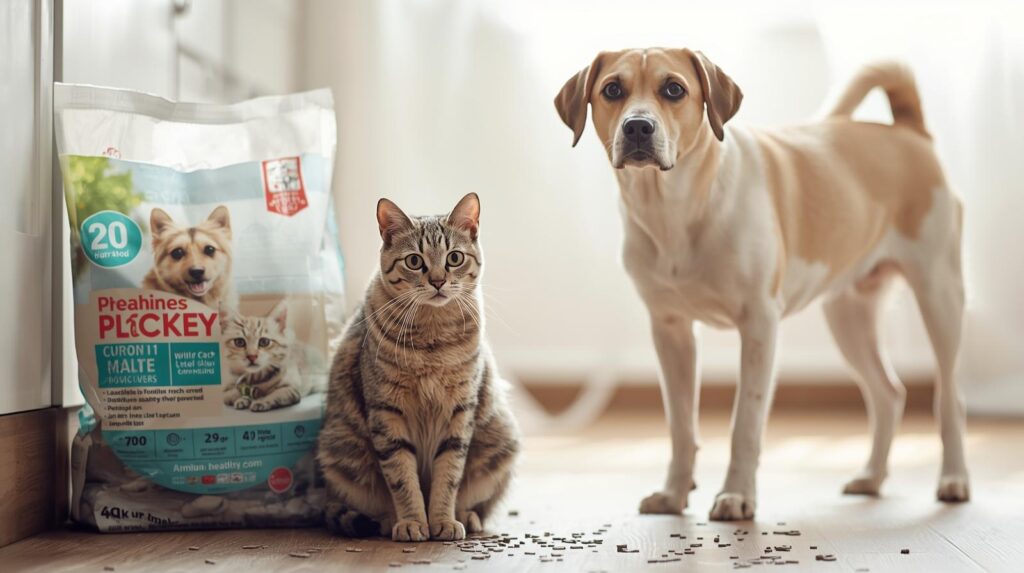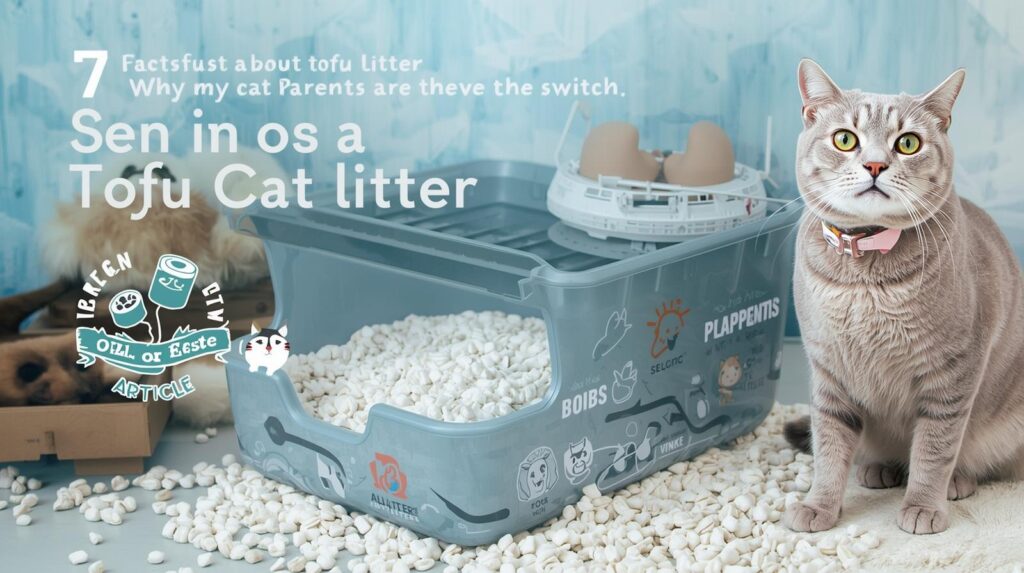
Dogs are naturally curious creatures, and sometimes their curiosity leads them straight to the cat’s litter box. While it may seem like an odd or even gross habit, many dogs are attracted to the scent or texture of cat litter. This raises an important question for pet parents: Can cat litter make dogs sick?
The short answer is yes—it can, depending on the type of litter, the amount eaten, and whether it’s contaminated with cat waste. While most cat litters aren’t toxic on their own, they can cause serious problems like digestive blockages, bacterial or parasitic infections, and other health issues if ingested. Knowing the risks, symptoms, and preventive measures is essential to keeping your dog safe and healthy.
Table of Contents
Are Cat Litters Toxic to Dogs?
Most cat litters are not directly toxic to dogs, but that doesn’t mean they’re safe. The danger usually comes from what happens when the litter is swallowed and mixes with moisture in the digestive tract, or when it’s contaminated with cat feces.
- Clumping cat litter (often made with sodium bentonite clay) can expand when wet, creating a risk of dangerous intestinal blockages.
- Non-clumping litters (such as paper, wood, or natural plant-based types) are generally less harmful but may still irritate a dog’s stomach if consumed in large amounts.
- Crystal/silica litters can be irritating to the digestive system and may cause vomiting or diarrhea.
- Scented or chemical-treated litters can lead to allergic reactions or gastrointestinal upset.
In short, while cat litter itself isn’t considered poisonous, it can make dogs sick if ingested, especially in large quantities or when combined with cat waste that carries harmful bacteria or parasites.
Health Risks of Dogs Eating Cat Litter
Even if cat litter isn’t outright toxic, it can still pose serious health risks for dogs. The type of litter, the amount ingested, and whether it’s mixed with cat waste all affect how dangerous it is. Here are the main risks:
1. Gastrointestinal Blockage
Clumping litter expands when it comes in contact with moisture. Inside your dog’s stomach or intestines, this can create a hard mass that blocks digestion. Gastrointestinal blockages may require emergency veterinary treatment or even surgery.
2. Digestive Irritation
Non-clumping or natural litters (like corn, wheat, or paper) don’t swell as much, but they can still cause vomiting, diarrhea, or constipation if eaten in large amounts.
3. Bacterial & Parasitic Infections
When a dog eats cat litter that contains cat feces, they may also ingest harmful bacteria like E. coli or parasites like toxoplasmosis. This can lead to infection, especially in puppies or dogs with weak immune systems.
4. Chemical & Fragrance Sensitivity
Some litters are treated with perfumes or chemicals to mask odor. These additives can trigger allergic reactions, drooling, or stomach upset in sensitive dogs.
5. Dental Damage
Hard litter pieces can scratch gums, chip teeth, or get stuck between the teeth, carrying bacteria from the litter box into the mouth.
Symptoms to Watch For if Your Dog Eats Cat Litter
If your dog sneaks into the litter box, it’s important to watch closely for warning signs. Even a small amount of litter can upset the stomach, while larger amounts may cause dangerous blockages or infections. Common symptoms include:
- Digestive Upset: vomiting, diarrhea, nausea, drooling
- Constipation: straining to poop, small or no bowel movements
- Abdominal Discomfort: bloating, swelling, whining when touched
- Behavioral Changes: lethargy, loss of appetite, hiding, restlessness
- Severe Signs: dehydration, bloody stool, convulsions, shock, or collapse
If you notice any of these symptoms—especially persistent vomiting, constipation, or signs of pain—contact your veterinarian immediately. Fast treatment can prevent serious complications like intestinal blockage or infection.
Toxoplasmosis & Other Infectious Diseases
One of the biggest dangers of dogs eating cat litter isn’t the litter itself—it’s the cat feces inside it. Cat waste can carry harmful organisms that put your dog’s health at risk.
Toxoplasmosis
- Caused by the parasite Toxoplasma gondii, which may be present in cat feces.
- While healthy adult dogs often show mild or no symptoms, puppies, seniors, and immunocompromised dogs are more vulnerable.
- Signs include fever, muscle weakness, loss of coordination, coughing, and seizures in severe cases.
Bacterial Infections
- Cat waste can contain bacteria like E. coli or Salmonella.
- Dogs that ingest contaminated litter may develop vomiting, diarrhea, abdominal pain, and dehydration.
Other Parasites
- Roundworms, hookworms, and other intestinal parasites can be transmitted through cat feces.
- These can lead to weight loss, poor coat condition, and digestive issues in dogs.
Important: If your dog starts showing symptoms such as persistent diarrhea, fever, or sudden weakness after eating cat litter, seek veterinary help right away.
What to Do if Your Dog Eats Cat Litter
If you catch your dog eating cat litter, don’t panic—but do take the right steps to protect their health. The response depends on how much litter was ingested and whether your dog is showing symptoms.
1. Stay Calm & Assess the Situation
- Note what type of litter your dog ate (clumping, non-clumping, silica, or natural).
- Estimate how much was swallowed—just a few licks, or a large amount?
2. Monitor for Symptoms
- Watch for vomiting, diarrhea, constipation, bloating, or lethargy over the next 24–48 hours.
- If your dog seems normal after a tiny amount, it may pass without issue.
3. Call Your Veterinarian
- Always contact your vet for advice, especially if your dog ate clumping litter or a large amount.
- Provide details about the litter type, amount, and your dog’s size/weight.
4. Emergency Situations
Seek veterinary care immediately if you notice:
- Persistent vomiting or diarrhea
- Signs of blockage (straining, no stool, swollen belly)
- Severe lethargy or dehydration
- Blood in stool or vomit
5. Do NOT Try Home Remedies Without Guidance
- Avoid inducing vomiting unless specifically directed by your vet.
- Some litter types expand when wet—forcing vomit can worsen the blockage.
Quick action can make the difference between a mild stomach upset and a life-threatening emergency.
How to Prevent Dogs from Eating Cat Litter
The best way to keep your dog safe is to stop the behavior before it starts. Since many dogs are naturally curious (and some even enjoy “snacking” on cat poop), prevention requires a mix of smart setup and training.
1. Restrict Access to the Litter Box
- Place litter boxes in areas only cats can reach, like behind baby gates, inside closets, or in rooms with cat doors.
- Consider top-entry, covered, or litter box enclosures to make access harder for dogs.
2. Keep the Litter Box Clean
- Scoop waste daily to reduce odors that attract dogs.
- Wash the litter box regularly with mild soap and water to minimize bacteria buildup.
3. Choose the Right Litter
- If your dog keeps trying to eat litter, avoid clumping or silica varieties, which pose the highest risk.
- Opt for natural or paper-based litters, which are less likely to cause blockages (but still not safe to eat).
4. Train & Redirect
- Use commands like “leave it” to teach your dog to stay away.
- Offer safe chew toys, treats, or puzzle feeders to distract dogs from the litter box.
5. Address Underlying Causes
Sometimes, dogs eat litter out of boredom, stress, or nutrient deficiencies.
- Ensure your dog is on a balanced diet.
- Provide daily exercise and mental stimulation to curb scavenging behavior.
By combining physical barriers with training and routine care, you can greatly reduce the risk of your dog getting sick from cat litter.
Final Takeaway: Can Cat Litter Make Dogs Sick?
Cat litter itself isn’t usually poisonous to dogs, but it can still make them very sick if eaten. The main dangers come from:
- Clumping litters, which may cause intestinal blockages
- Bacterial and parasitic infections from cat feces
- Digestive upset or allergic reactions from chemicals or fragrances
If your dog ingests a small amount of litter, they may only experience mild stomach upset. But larger amounts—or exposure to contaminated litter—can lead to serious health issues that require urgent veterinary care.
The best approach is prevention: keep litter boxes out of reach, clean them regularly, train your dog to avoid them, and provide healthy alternatives for chewing or curiosity.
Bottom line: Yes, cat litter can make dogs sick—sometimes dangerously so. Staying vigilant and taking preventive steps will help protect your pup’s health and keep your home cleaner and safer for all your pets.
FAQs About Dogs and Cat Litter
1. Can cat litter make dogs sick?
Yes. While most cat litters aren’t directly toxic, eating them can lead to digestive upset, blockages, or infections from contaminated feces.
2. What happens if my dog eats clumping cat litter?
Clumping litter expands when wet and may cause an intestinal blockage, which can be life-threatening. Contact your vet immediately if a large amount is eaten.
3. Is cat litter toxic to dogs?
Cat litter itself usually isn’t poisonous, but some scented or chemical-treated litters may cause stomach upset or allergic reactions.
4. Can dogs get parasites from cat litter?
Yes. If the litter contains cat feces, your dog can contract toxoplasmosis, roundworms, or bacterial infections like E. coli.
5. How do I know if my dog has a blockage from cat litter?
Watch for symptoms like vomiting, constipation, bloated abdomen, loss of appetite, and lethargy. These require urgent veterinary care.
6. What should I do if my dog ate cat litter?
Monitor for symptoms if only a small amount was ingested.
Call your vet for guidance, especially if your dog is a puppy, small breed, or ate clumping litter.
Go to the vet immediately if severe signs appear.
7. How can I stop my dog from eating cat litter?
Keep litter boxes out of reach, clean them daily, use covered or top-entry boxes, and train your dog with commands like “leave it”.


